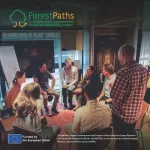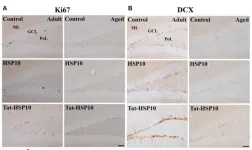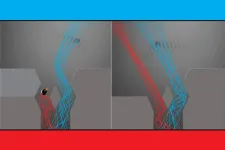(Press-News.org) A major clinical trial, led by experts at the University of Nottingham, has shown that people with inflammatory conditions are able to improve the antibody response from a COVID-19 booster vaccination by interrupting their treatment for two weeks immediately after having the vaccine.
The antibody response to the jab was doubled at four weeks, and one and a half times greater at 26 weeks, when compared to those who continued with their treatment as usual. The improved antibody response lasted for six months. Patients who interrupted treatment reported experiencing more flare-ups of their inflammatory conditions in the next few weeks, but most flares were self-managed, and most didn’t need help from a healthcare provider.
The trial is funded by a National Institute for Health and Care Research (NIHR) and Medical Research Council (MRC) partnership.
The interim findings of the Vaccine Response On Off Methotrexate (VROOM) trial (which was restricted to 250 patients and followed-up for 12 weeks) were previously published in Lancet Respiratory Medicine. They have already influenced the British and American clinical guidelines.
The full trial findings from 383 participants, which are published in Lancet Rheumatology, show that the improved protection lasts for six months. The full trial also shows that the blood from people who stopped methotrexate was also more efficient at killing the Wuhan strain and the Omnicron BA.1 variant. It also shows that when the six-month follow-up period was considered, there was no excess risk of disease flares in patients who suspended their treatment immediately after a COVID-19 booster vaccination.
These findings will be useful for national immunisation advisory committees, and other specialist societies formulating recommendations on the timing of vaccination in those treated with or starting medicines that turn down the immune system.
The VROOM trial recruited patients with a range of inflammatory conditions treated with methotrexate. Methotrexate is the most used immune-suppressing drug, with around 1.3 million people in the UK prescribed this medicine for inflammatory conditions such as rheumatoid arthritis, and skin conditions such as psoriasis. Many of them were among the 2.2 million clinically extremely vulnerable people advised to shield during the first phase of the COVID-19 pandemic, depending on specialist advice and on their risk factors.
While methotrexate is effective at controlling these conditions and has emerged as first line therapy for many illnesses, it reduces the body’s ability to fight infections and the ability to generate a robust response to flu and pneumonia vaccines, including those against COVID-19.
Chief Investigator, Professor Abhishek at the University of Nottingham and Honorary Consultant Rheumatologist at Nottingham University Hospitals NHS Trust, said: “COVID-19 has not gone away, and with the emergence of new variants, and vaccine hesitancy among patients, it is important to optimise durable protection in people who are susceptible to COVID-19. Evidence from our trial will help patients and clinicians make informed choices about the risks and benefits of interrupting methotrexate treatment around the time of vaccination against COVID-19.”
Professor Danny McAuley, Scientific Director for NIHR Programmes, said: "As winter approaches, millions of people with compromised immune systems are still vulnerable to becoming unwell from COVID-19, despite the disease being less prevalent than it once was.
"This important research provides even more high quality evidence that by managing medicines in relation to vaccinations we can keep patients healthier while reducing pressure on the NHS.”
The study was carried out in collaboration with colleagues from the University of Manchester, Imperial College London, the University of Oxford, Queen Mary University London, UK Health Security Agency (formerly Public Health England) and participating NHS hospitals. The study was managed by the Oxford Clinical Trials Research Unit (OCTRU).
A free video explaining the study results is available here.
A major clinical trial, led by experts at the University of Nottingham, has shown that people with inflammatory conditions are able to improve the antibody response from a COVID-19 booster vaccination by interrupting their treatment for two weeks immediately after having the vaccine.
The antibody response to the jab was doubled at four weeks, and one and a half times greater at 26 weeks, when compared to those who continued with their treatment as usual. The improved antibody response lasted for six months. Patients who interrupted treatment reported experiencing more flare-ups of their inflammatory conditions in the next few weeks, but most flares were self-managed, and most didn’t need help from a healthcare provider.
The trial is funded by a National Institute for Health and Care Research (NIHR) and Medical Research Council (MRC) partnership.
The interim findings of the Vaccine Response On Off Methotrexate (VROOM) trial (which was restricted to 250 patients and followed-up for 12 weeks) were previously published in Lancet Respiratory Medicine. They have already influenced the British and American clinical guidelines.
The full trial findings from 383 participants, which are published in Lancet Rheumatology, show that the improved protection lasts for six months. The full trial also shows that the blood from people who stopped methotrexate was also more efficient at killing the Wuhan strain and the Omnicron BA.1 variant. It also shows that when the six-month follow-up period was considered, there was no excess risk of disease flares in patients who suspended their treatment immediately after a COVID-19 booster vaccination.
These findings will be useful for national immunisation advisory committees, and other specialist societies formulating recommendations on the timing of vaccination in those treated with or starting medicines that turn down the immune system.
The VROOM trial recruited patients with a range of inflammatory conditions treated with methotrexate. Methotrexate is the most used immune-suppressing drug, with around 1.3 million people in the UK prescribed this medicine for inflammatory conditions such as rheumatoid arthritis, and skin conditions such as psoriasis. Many of them were among the 2.2 million clinically extremely vulnerable people advised to shield during the first phase of the COVID-19 pandemic, depending on specialist advice and on their risk factors.
While methotrexate is effective at controlling these conditions and has emerged as first line therapy for many illnesses, it reduces the body’s ability to fight infections and the ability to generate a robust response to flu and pneumonia vaccines, including those against COVID-19.
Chief Investigator, Professor Abhishek at the University of Nottingham and Honorary Consultant Rheumatologist at Nottingham University Hospitals NHS Trust, said: “COVID-19 has not gone away, and with the emergence of new variants, and vaccine hesitancy among patients, it is important to optimise durable protection in people who are susceptible to COVID-19. Evidence from our trial will help patients and clinicians make informed choices about the risks and benefits of interrupting methotrexate treatment around the time of vaccination against COVID-19.”
Professor Danny McAuley, Scientific Director for NIHR Programmes, said: "As winter approaches, millions of people with compromised immune systems are still vulnerable to becoming unwell from COVID-19, despite the disease being less prevalent than it once was.
"This important research provides even more high quality evidence that by managing medicines in relation to vaccinations we can keep patients healthier while reducing pressure on the NHS.”
The study was carried out in collaboration with colleagues from the University of Manchester, Imperial College London, the University of Oxford, Queen Mary University London, UK Health Security Agency (formerly Public Health England) and participating NHS hospitals. The study was managed by the Oxford Clinical Trials Research Unit (OCTRU).
A free video explaining the study results is available here.
END
Patients can interrupt treatment of immune-supressing medicines for two weeks in order to boost immunity provided by COVID-19 booster vaccine, finds major study
2023-12-13
ELSE PRESS RELEASES FROM THIS DATE:
Mental health care gaps for women veterans - report
2023-12-13
Issues of identity, male-dominated branding and apprehension that their needs will go unmet are among the reasons women are not accessing veterans’ mental health support, according to new research being discussed today (Wednesday, 13 December) at a conference in Cambridge.
The report, I don’t feel like that’s for me: Overcoming barriers to mental healthcare for women veterans, was carried out by the Centre for Military Women’s Research (CMWR) at Anglia Ruskin University (ARU), to investigate the low numbers of ex-servicewomen engaging with veteran-specific mental health services.
The ...
National policy aimed at reducing U.S. greenhouse gases also would improve water quality
2023-12-13
WEST LAFAYETTE, Ind. — A climate policy that raises the price of carbon-intensive products across the entire U.S. economy would yield a side benefit of reducing nitrate groundwater contamination throughout the Mississippi River Basin.
The Gulf of Mexico, an important U.S. fishery, also would see modest benefits from the nitrate reductions. These were among the conclusions of a recent study published in the Proceedings of the National Academy of Sciences (PNAS).
The study, led by four early career researchers, three of them from ...
Twenty-year study confirms California forests are healthier when burned — or thinned
2023-12-13
Berkeley — A 20-year experiment in the Sierra Nevada confirms that different forest management techniques — prescribed burning, restoration thinning or a combination of both — are effective at reducing the risk of catastrophic wildfire in California.
These treatments also improve forest health, making trees more resilient to stressors like drought and bark beetles, and they do not negatively impact plant or wildlife biodiversity within individual tree stands, the research found. The findings of the experiment, called the Fire Surrogate Study, were published today in the journal Ecological Applications.
“The research ...
Caregiving can be stressful, but it could also lower risk of depression
2023-12-12
Becoming a caregiver to an aging parent or spouse can be stressful, but a new study from a researcher at The University of Texas at Austin is questioning the idea that family caregiving is also a risk factor for depression.
The study, published in the journal Advances in Life Course Research, found that depression in adult caregivers is mostly driven by having a loved one experiencing serious health problems, while becoming a caregiver is associated with fewer symptoms of depression.
“Decades of research on this topic indicate that there are positive and negative aspects to being a caregiver,” said Sae Hwang Han, ...
UCF researcher discovers new technique for photon detection
2023-12-12
University of Central Florida researcher Debashis Chanda, a professor at the NanoScience Technology Center, has developed a new technique to detect photons — elementary particles that span from visible light to radio frequencies and are instrumental in carrying cellular communication.
The advancement could lead to more precise and efficient technologies in various fields, from improving medical imaging and communication systems to enhancing scientific research and even potentially bolstering security measures.
Photon detection has typically relied on change/modulation of voltage or ...
Fat flies live longer on a diet at any age
2023-12-12
Old, obese flies get healthier and live longer if put on a diet, University of Connecticut researchers report on Dec. 8 in PNAS. If the effect holds true for humans, it would mean it’s never too late for obese people to improve their health with diet.
For way too many of us, eating too much goes along with getting old and a tendency to be obese. Different health organizations define obesity differently, but all agree it means having too much body fat, and is associated with a host of diseases related to metabolism including heart disease and diabetes. Many animal studies have shown that eating less—meaning sharply ...
European Policy Lab gathers stakeholders to map forest policy opportunities and barriers
2023-12-12
ForestPaths’ first Policy Lab convened stakeholders in Helsinki, Finland, on 27-29 September 2023. Nineteen carefully selected participants with diverse expertise – including research, policy, governance, civil society, value chain professionals, and forestry practitioners – engaged in discussions on forest-based policymaking and modelling related to climate change and biodiversity.
Tasked with considering policy actions given different timescales, governance paradigms, enablers, and barriers, participants contributed ...
Tat-heat shock protein 10 ameliorates age-related phenotypes in the hippocampus
2023-12-12
“Mitochondrial dysfunction is a major cellular change observed in the hippocampus during aging.”
BUFFALO, NY- December 12, 2023 – A new research paper was published in Aging (listed by MEDLINE/PubMed as "Aging (Albany NY)" and "Aging-US" by Web of Science) Volume 15, Issue 22, entitled, “Tat-heat shock protein 10 ameliorates age-related phenotypes by facilitating neuronal plasticity and reducing age-related genes in the hippocampus.”
In this new study, researchers Hyo Young Jung, Hyun Jung Kwon, Kyu ...
MIT researchers observe a hallmark quantum behavior in bouncing droplets
2023-12-12
In our everyday classical world, what you see is what you get. A ball is just a ball, and when lobbed through the air, its trajectory is straightforward and clear. But if that ball were shrunk to the size of an atom or smaller, its behavior would shift into a quantum, fuzzy reality. The ball would exist as not just a physical particle but also a wave of possible particle states. And this wave-particle duality can give rise to some weird and sneaky phenomena.
One of the stranger prospects comes from a thought experiment known as the “quantum bomb tester.” The experiment proposes that a quantum particle, such ...
Smoking causes brain shrinkage
2023-12-12
Smoking shrinks the brain, according to a study by researchers at Washington University School of Medicine in St. Louis. The good news is that quitting smoking prevents further loss of brain tissue — but still, stopping smoking doesn’t restore the brain to its original size. Since people’s brains naturally lose volume with age, smoking effectively causes the brain to age prematurely, the researchers said.
The findings, published in Biological Psychiatry: Global Open Science, help explain why smokers are at high risk of age-related cognitive decline and Alzheimer’s disease.
“Up until recently, scientists have overlooked ...




